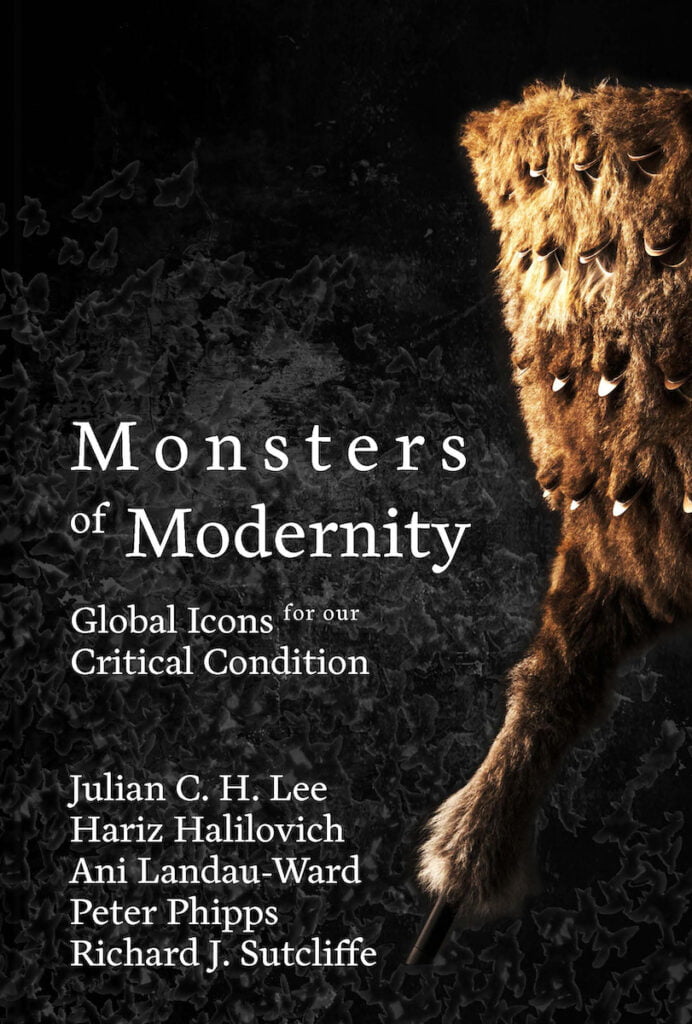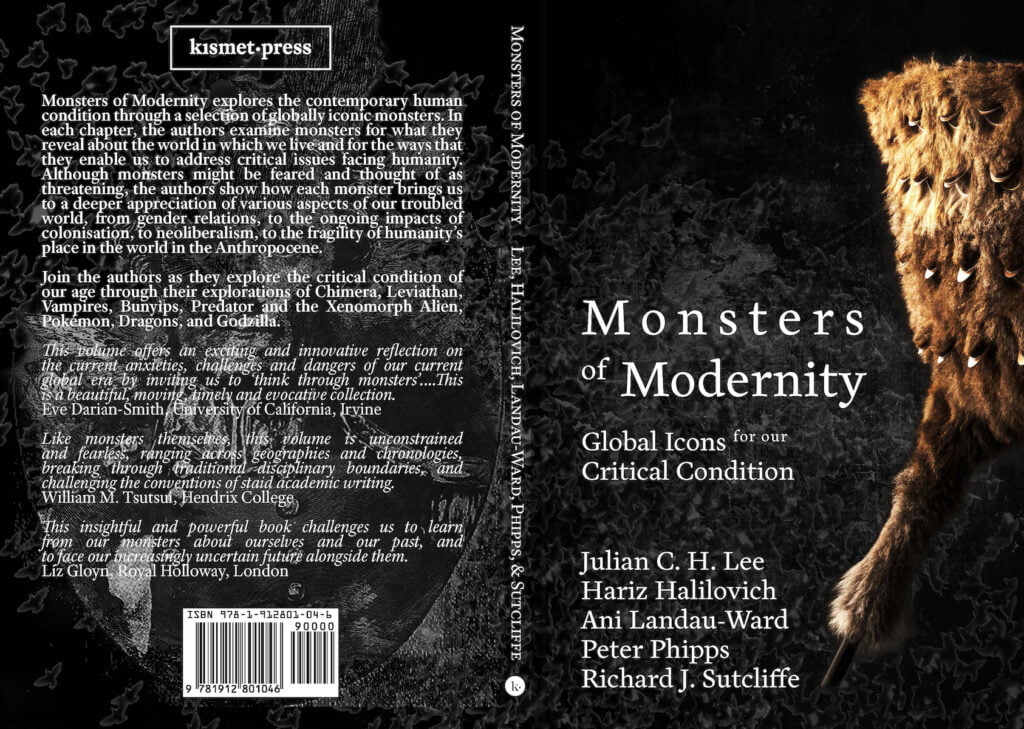Global Icons for our Critical Condition
by Julian C. H. Lee, Hariz Halilovich, Ani Landau-Ward, Peter Phipps, Richard J. Sutcliffe
Julian C. H. Lee, Hariz Halilovich, Ani Landau-Ward, Peter Phipps, Richard J. Sutcliffe. Monsters of Modernity: Critical Icons for our Critical Condition. Monsters and Monstrosity 1. Leeds: Kısmet Press, 2019.

Title: Monsters of Modernity: Critical Icons for our Critical Condition
Authors: Julian C. H. Lee, Hariz Halilovich, Ani Landau-Ward, Peter Phipps, Richard J. Sutcliffe
Series: Monsters and Monstrosity
Series number: 1
Place of publication: Leeds
Publisher: Kısmet Press
Date of publication: 2019
ISBN 978-1-912801-04-6 (pbk)
ISBN 978-1-912801-06-0 (hbk)
ISBN 978-1-912801-05-3 (ebk)
viii + 186 pages
219 x 148 mm
Copyright information
Copyright © 2019 Julian C. H. Lee, Hariz Halilovich, Ani Landau-Ward, Peter Phipps, Richard J. Sutcliffe.
Published by Kismet Press LLP under an exclusive license to publish. Commercial copying, hiring, lending is prohibited. The book is freely available online at kismet.press under a Creative Commons Attribution-NonCommercial-NoDerivatives 4.0 International (CC BY-NC-ND 4.0) license.
About the book
Monsters of Modernity explores the contemporary human condition through a selection of globally iconic monsters. The authors explore diverse monsters for what they reveal about the world in which we live and for the ways that they enable us to address critical issues facing humanity. Although monsters might be feared and thought of as threatening, the authors show how each monster brings us to a deeper appreciation of various aspects of our troubled world, from gender relations, to the ongoing impacts of colonisation, to neoliberalism, to the fragility of humanity’s place in the world in the Anthropocene.
Monsters of Modernity explores new ground in the conventions of authorship and scholarship, and will be a valuable companion to anyone interested in the study of monsters as well as those seeking engaging ways to explore and teach key global issues. Join the authors as they explore the critical condition of our age through their explorations of Chimera, Leviathan, Vampires, Bunyips, Predator and the Xenomorph Alien, Pokémon, Dragons, and Godzilla.
About the authors
Julian C.H. Lee is Associate Professor in Global Studies at RMIT University, Australia. He is the author of a number of books including Policing Sexuality: Sex, Society and the State; Second Thoughts: On Globalisation, Malaysia, Society and Self; and Women’s Activism in Malaysia. He is also the editor or co-editor of several volumes including Narratives of Globalization; Punks, Monks and Politics: Authenticity in Thailand, Indonesia and Malaysia; and Trajectories: Excursions with the Anthropology of E. Douglas Lewis. In addition to having been a columnist for magazines in Malaysia and Australia, he has also produced several short documentaries including ‘For Japan, Our Sister’; ‘Caring at a Distance’; and ‘Be a Superhero’.
Ani Landau-Ward is associated with the Social and Global Studies Centre and the Centre for Urban Research at RMIT University, where she has been teaching international development, social and political theory, and globalisation in RMIT’s Bachelor of Arts (International Studies) program. Her current PhD research is a socio-legal analysis of the governance and justice implications of digitisation in property rights administration, in the international law and development field. She brings to her academic work professional experience in community work, land and housing justice advocacy, and participatory architectural design. Her research has been presented at the annual meetings of The Association for Law Property and Society, and the International Academic Association on Planning, Law, and Property Rights. She has also published on the opportunities for Indigenous land governance with the Centre for Urban Research. Her scholarly writing has been published in the Springer Global Encyclopedia of Public Administration, Public Policy, and Governance; the New Zealand Journal of Asian Studies, and the volume Urban Asias: Essays on Futurity Past and Present.
Hariz Halilovich is an award-winning social anthropologist and author; he is Associate Professor and Vice-Chancellor’s Senior Research Fellow at the Social and Global Studies Centre, RMIT University, Melbourne. His main research areas include place-based identity politics, forced migration, politically motivated violence, memory studies and human rights. Much of his work has an applied focus, and he has conducted research on migration and human rights-related issues for a range of non-governmental and governmental bodies, including the Minister for Immigration and Citizenship (Australia). His award-winning book Places of Pain: Forced Displacement, Popular Memory and Trans-local Identities in Bosnian War–torn Communities was published by Berghahn, New York–Oxford and his latest book Writing After Srebrenica by Buybook, Sarajevo. In addition to academic text-based outputs, he has also produced multimedia exhibitions, works of fiction and radio and TV programs.
Peter Phipps is a Senior Lecturer in Global Studies at RMIT University, where he is also associated with the Social and Global Studies Centre. He undertook post-graduate training in cultural anthropology at the University of California Berkeley, and completed a PhD on the cultural politics of postcolonial theory at the University of Melbourne. He has published in journals including Ethnos, Alternatives, and Communication, Politics and Culture on Indigenous festivals, commemorations, tourism and the politics of cultural globalization. He is a founding member of the Centre for Global Research and has consulted to a number of organizations and government bodies including the City of Melbourne, Victorian Multicultural Commission, the PNG Department for Community Development, ATSIC, ATSIAB (Australia Council), UNDP (Sarajevo) and the Yothu Yindi Foundation.
Richard J. Sutcliffe is an independent researcher who has conducted research on new religious movements and urban youth culture. He is interested in the role of the creative imagination in the articulation of human social life and the inter-urban dynamics of emergent forms of transnational visual culture. He has written on subjects including Western esotericism, social theories of modernity, globalization, and street art. His writing has been published in places including the journal Canberra Anthropology, and in the volumes Paganism Today, Managing Modernity in the Western Pacific, The Malaysian Way of Life, Second Thoughts: On Malaysia, Globalisation, Society and Self, and the Springer Global Encyclopedia of Public Administration, Public Policy, and Governance.
Table of contents
1. Here Be Dragons
2. The Functional Autonomy of Monsters – A Metalogue
3. Polymorphous Monstrosity: Some Chimerical Reflections on the Question – What are Monsters?
4. The Bunyip, and Other Australian Monsters
5. Leviathan, the Sovereign
6. Is Alien to Predator as Nature is to Culture?
7. Vampires and Ratko Mladić: Balkan Monsters and The Monstering of People
8. Pokémon Reaping
9. Godzilla, The Unmocked God
Ways to support, or how to purchase this book
All publications by Kısmet Press are and always will be free to read online. If you would like to support us, you can purchase our books in print and electronic forms from most online bookstores. You can also order our print publications from your local independent bookshop. Since we use a print-on-demand system, occasionally our printed publications may be listed as “temporarily unavailable” or “out of stock”, but this is almost always misleading. Please feel free to get in touch with us if you experience problems in purchasing our publications. Here are our our suggestions for online platforms for purchases:
*When you make a purchase using these links Kısmet Press may earn a small commission, which also helps us. This does not affect the price that you pay for any of our publications.

